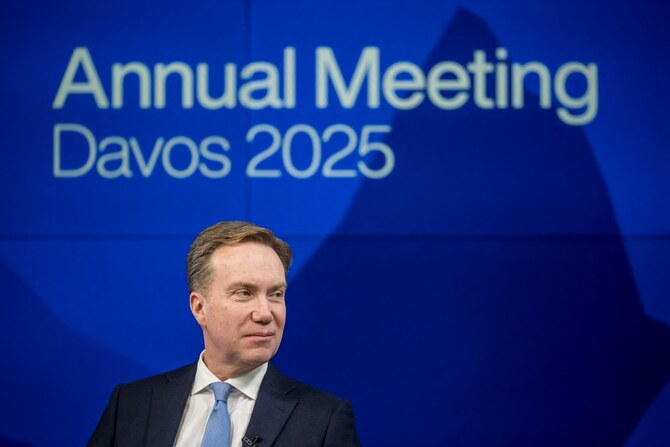LONDON: The Middle East will have a significant presence at the annual meeting of the World Economic Forum next week, reflecting the growing influence of emerging markets, the organization said on Tuesday.
Mirek Dusek, the forum’s managing director, said he was “pleased” with the increase in the number of representatives from emerging markets expected to attend the event. He added that the “proportion is growing this year. We’re seeing particularly strong numbers, for example, from the Middle East, also from South Asia.”
Nearly 3,000 people from more than 130 countries, including 900 business leaders, are expected to attend the annual meeting, which will take place in Davos, Switzerland, from Jan. 20 to 25.
The forum has faced repeated criticism from some for being an elite gathering focused on the traditional major powers and big business, but Dusek highlighted the growing presence of leaders from the Global South. He said participation among developing nations was now “on parity” with that of developed countries.
The theme of this year’s meeting is “Collaboration for the Intelligent Age” and it will address “five distinct but interconnected thematic priorities,” the forum said, reflecting its efforts to navigate a complex geopolitical and economic landscape.
“(The agenda) is linked, first and foremost, to this deep sense of being on the cusp of a new era for the world economy, or at least in transition to a new situation for the world economy,” Dusek said.
Key discussions will consider the transformative effects of rapid technological advances, including developments in artificial intelligence, as well as the challenges arising from geopolitical fragmentation and the need to foster global collaboration during what Dusek described as a “key time for the world economy.”
The forum will also address issues such as economic growth, trade and investment, exploring “new sources of growth in this global economy.” It will examine how the public and private sectors can invest in the development of human capital and create quality jobs to help build modern and resilient societies.
The forum’s president and CEO, Borge Brende, said: “It is our 55th annual meeting taking place in Davos, and it is happening against the most complicated geopolitical backdrop in generations. But still, in the fragmented and partly polarized world, there are still areas where we can collaborate.”
The Middle East is expected to play a pivotal role in the discussions, as the forum addresses ongoing conflicts in the region and its future prospects.
Syria’s foreign minister, Asaad Hassan Al-Shaibani, is scheduled to present his country’s plans for the future after the fall of the Assad regime in December after its 52-year rule.
The humanitarian crisis in Gaza will also feature prominently in discussions, alongside efforts to rebuild trust and promote reconciliation in the region. Israeli President Isaac Herzog, Palestinian Prime Minister Mohammed Mustafa, Iranian Vice President Mohammed Reza Aref, and the UN’s special envoy for Yemen, Hans Grundberg, are among the key speakers who will address the issues.
“We were very close (to a full-scale conflict) between Israel and Iran, and I don’t think we’re out of the woods yet,” said Brende, as he expressed hope that the forum will serve as a platform “for peace, reconciliation, and addressing humanitarian suffering.”
Rebuilding trust between institutions and efforts to address climate change are other longstanding priorities for forum, and organizers said these will remain central to the discussions.
Amid concerns that such topics have been “losing ground” amid other political and economic challenges, Gim Huay Neo, the forum’s managing director, reiterated its focus on finding and implementing tangible solutions.
“There will be multiple dialogs that will be really focused around tangible action that companies and governments can take to support the net-zero, nature-positive transition pathways and, more importantly, how they can work together to build partnerships that can enable and empower the action in a faster and much more skilled manner,” she said.
In a surprise announcement, Brende said US President-elect Trump, whose inauguration coincides with the opening day of the forum, would participate via a digital address. He is expected to outline his administration’s plans for implementing its policies, in particular his pledge to end the war in Ukraine.
Ukrainian President Volodymyr Zelensky will also deliver a special address and take part in a question-and-answer session.
In total, 60 heads of state and government will take part in the event, including European Commission President Ursula von der Leyen and Chinese Vice Premier Ding Xuexiang.























